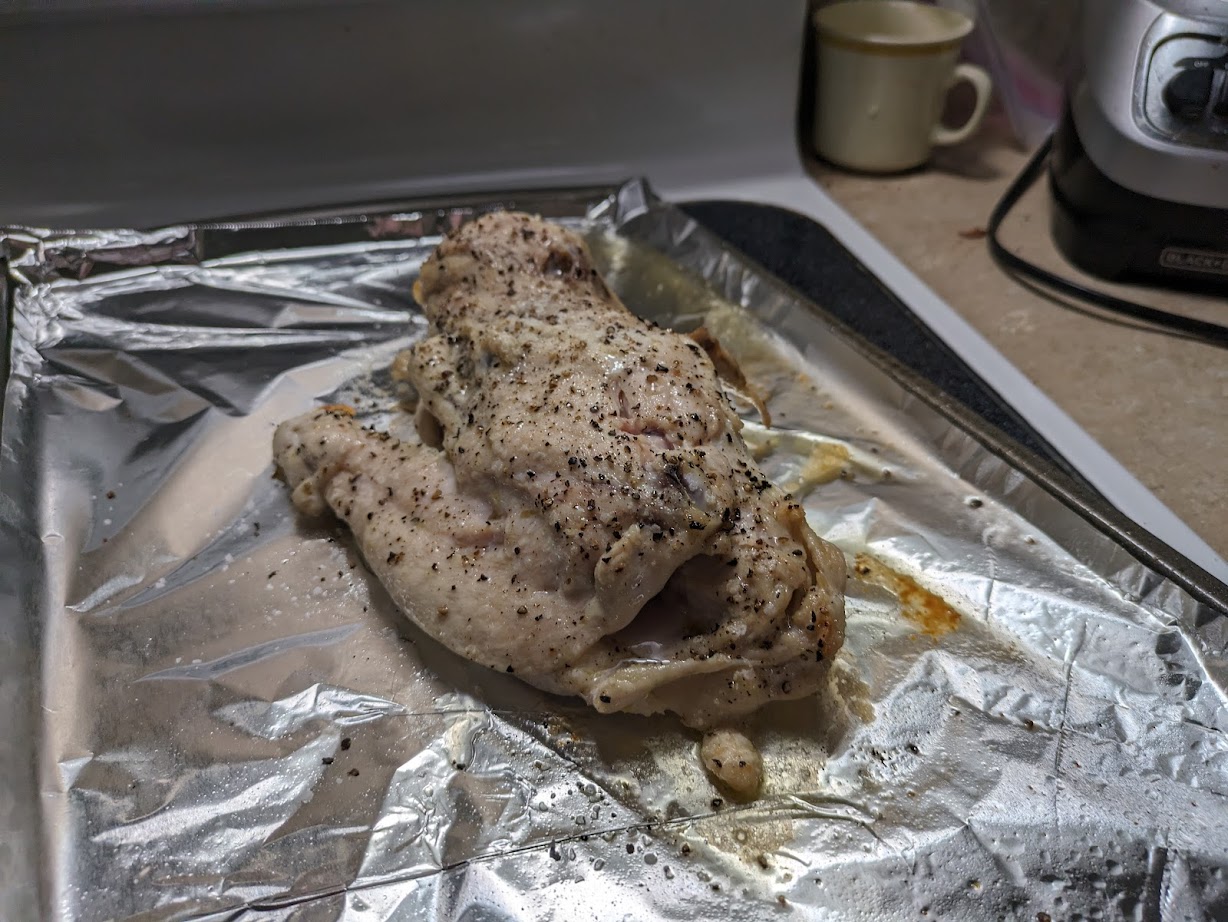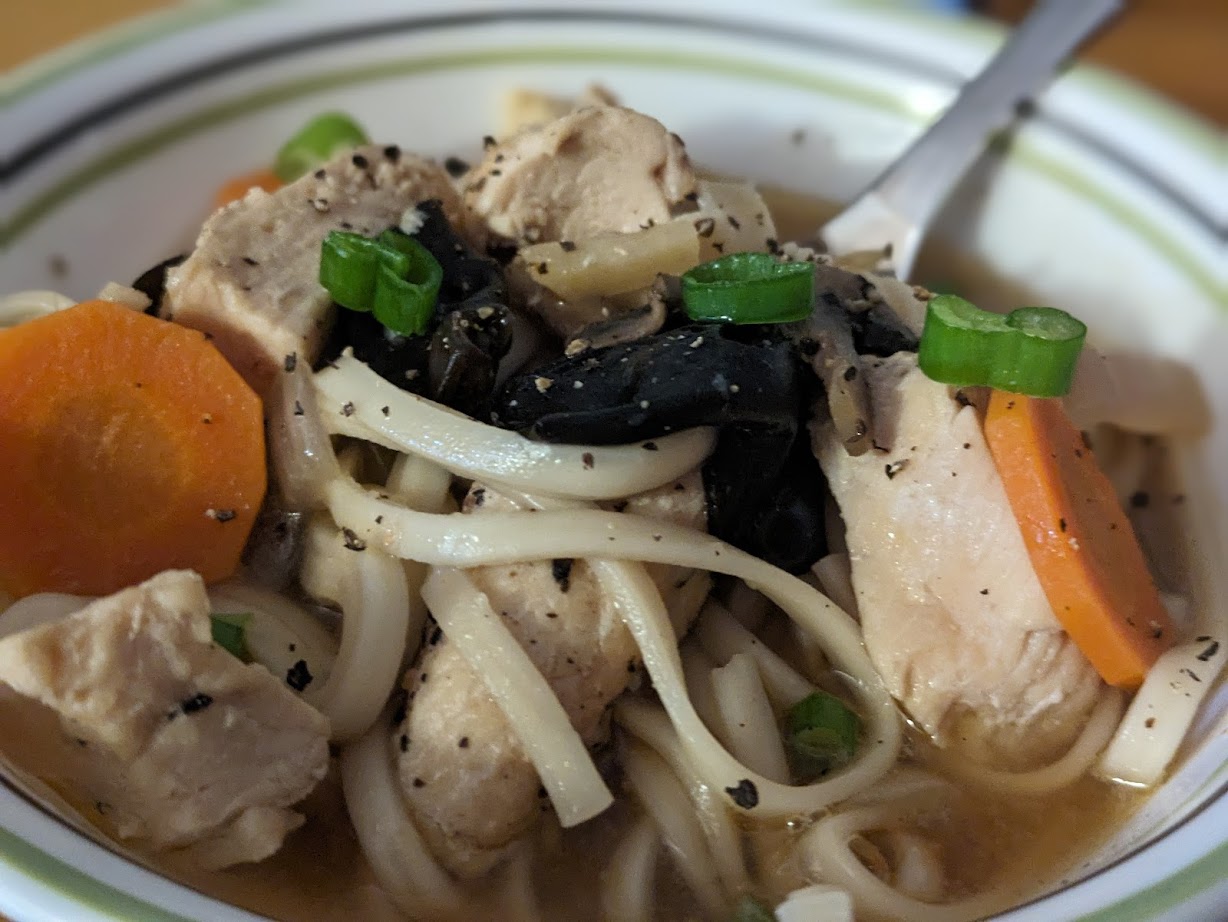Told you there'd be one more. So, if you remember way back in Part 1, we broke down a whole chicken. We separated out the tenderloins and skin, two breasts, two wings, two legs, and two thighs, and we were left with the rest of the carcass: bones, a little bit of meat, a patch or two of skin, some crushed organs up in there, etc.
So this is what I used for making broth. Broth is super useful for soup bases, sauce bases, or just to sip on if you've got a sore throat. It's relatively low effort, but can take a bit of time depending on how you want it to go. If you make your own, you can season it however you like and really come up with some fun customizations. You can include veggies, bones, odds and ends; I keep a ziploc of veggie scraps in the freezer for broth and highly recommend it (PSA: cut down on food waste!) I kept it simple this time, though - just chicken carcass.
For a basic broth, I just rub down the carcass with some extra virgin olive oil and season generously with kosher salt and cracked black pepper.
I heat my oven to 425 or 450, depending on what I think is the right temperature that day, and stick it in there for about 20-25 minutes, at which point, I flip it and stick it back in for another 15 or so minutes.
When the carcass is all cooked up, I stick it in a sauce pot, put in a bunch of water, and then get that shit boiling.
As soon as it hits a boil, I reduce the heat and try to keep it simmering the rest of the time I'm cooking. I also typically throw a lid on it. Then I let it simmer for about 6-8 hours, typically.
You want to see the liquid thicken up some and get some color, and you want to see the volume reduce over time (the faint line in the pot is where it started) - this is where the science (here's a fancy term to show off to people: molecular gastronomy) comes in. In layman's terms, the longer the broth cooks, the more flavor the water takes on from the chicken (and whatever else you have in there). Also (and this is more "common sense" than molecular gastronomy), the more the liquid reduces, the higher the concentration of flavor *and* the less you'll have. So, depending on time constraints and how you plan to use it, you may want to just boil it the whole time uncovered to reduce volume and take less time; the flavor may be a little less full and you may have less volume, but it will get the job done and should work for things like cooking pasta or rice if you don't want to put too much chicken flavor in them. Alternatively, I've simmered some pots of broth for over 24 hours: low heat, kept covered, so minimal evaporation, but plenty of flavor seeped out of the bones. I typically do a longer broth when I'm using split beef femurs or if I'm making stock (basically the highest concentration broth).
Note: while it's simmering, be sure to taste often and season as desired. I usually end up adding a bit more salt and pepper while it's going, as well as any other flavors I want the broth to have. Bonus points if you throw in some dried ghost pepper... Just remember that what you add will be dispersed throughout the volume over time, but that concentration will increase as the volume decreases.
When it's done cooking, strain the broth out to get rid of bones, meat, etc. If you're planning to store it, make sure to skim as much of everything out as you can; taking a metal ladle with an ice cube in it and running the bottom of it all over the surface will cause fat and shit to congeal for quick removal. I was using my broth this time for ramen, so I didn't bother removing *everything* this time.
Bonus ramen pic.
One last thing: storage. If you're not planning to use it all, be sure to have containers to store your broth. I usually will clean out a couple milk jugs when I'm planning to make broth (I plan ahead due to needing to reserve cook time anyway). I also try to have an empty ice tray handy to freeze broth cubes for when I want to add a little flavor to a dish. Want a fun way to deglaze? Broth cube. Just be sure that whatever isn't frozen is used up within 3-5 days. It may keep longer (and the cleaner it is, the longer it lasts; if you leave fat in there, it's gonna get rancid as fuck pretty quickly).









Comments
Post a Comment